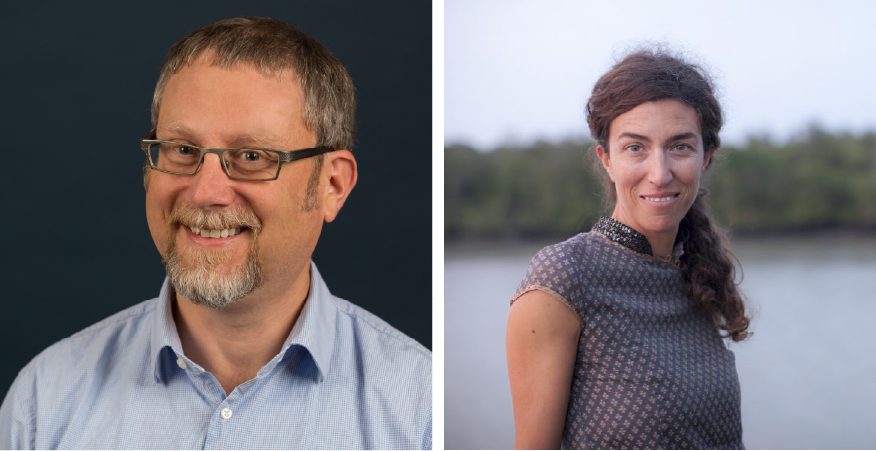
From outgoing chair, Adam Rabinowitz:
When I walked into a room with six strangers in the early spring of 2017 to discuss the possibilities of a shared Grand Challenge focusing on “sustainability and habitability,” I had no idea that I would be embarking on a project that would fundamentally change my own research and my ideas about multidisciplinary inquiry. It has been five and a half years since those early days of seeking common ground and a common language, and in that time, I have come to understand how transformative transdisciplinary research can be. Since our Grand Challenge took shape as Planet Texas 2050, with its goal of making Texas resilient, sustainable, and equitable in the face of climate change and demographic challenges, I have worked shoulder to shoulder with geoscientists, English professors, historians, civil engineers, urban planners, geographers and Maya specialists, Classicists and anthropologists, performers and visual artists. My own research questions have grown to encompass the present and future as well as the past, and my collaborations with colleagues outside my field and with community partners have broadened exponentially.
This has been immensely exciting and satisfying for me on a personal and professional level. But I am most gratified not by the benefits I myself have derived, but by the model we have built for the integration of humanities and the arts in a Grand Challenge program. From the beginning, we sought to incorporate perspectives from both qualitative and quantitative fields on an equal footing, and to ensure that humanities and the arts had a permanent seat at the table even as we explored STEM-driven solutions. When our flagship projects launched in 2020, each expressly included humanities researchers, artistic collaborations, and community partners alongside engineers and computer scientists. During my time as chair, we have seen our original Artist-in-Residence program transformed into a collaborative space for creative professionals and flagship research teams, and we have added new Organizing Committee members whose specific focus will be on strengthening the integration of our quantitative data and the fusing of research and creative work.
Our commitment to the creation of a disciplinary meeting ground and to the co-creation of knowledge with stakeholders is now bearing real fruit. All of us involved in Planet Texas 2050 have shared common goals from the start, but it is only in the last couple of years that our diverse research and engagement activities have come together to form a whole that is truly greater than the sum of its parts. The pathways that connect our disciplines have become clearer, and the different facets of our research illuminate Planet Texas 2050’s central challenges from new angles. And this synthesis is now independent of the individuals who gathered to plan the Grand Challenge five years ago, in a pre-COVID world. I am the last of the founding members of Planet Texas 2050 currently serving on the Theme Organizing Committee, but as those original members have rotated off, we have brought forward new leaders whose vision and passion carry the project forward toward the same goals, with just as much energy and commitment as we brought to its beginnings.
I am proud not only of all that the Planet Texas 2050 community has accomplished already, but also – especially – of this successful transition of leadership and the steady trajectory of the project. Our new Chair, Paola Passalacqua, brings to the position an impressive sense of the connections across Planet Texas 2050 flagships, and I know that those connections will only grow stronger under her leadership. I am excited to watch Planet Texas 2050 begin to realize, under her guidance, the ambitious outcomes we imagined in those early days.
From incoming chair, Paola Passalacqua:
In the Spring of 2020, I was invited to join Planet Texas 2050’s Theme Organizing Committee (TOC) as co-lead of one of six flagship projects. Our flagship focuses on network approaches for hazard preparedness and response. Our project, as the other flagship projects, is exciting, theoretically complex, and at the same time has societal relevance and practical implications for how emergency managers and residents prepare for and respond to emergencies.
Very often there is a gap between academic research and what is used on the ground and in the profession. Floods are an example; there have been many decades of research in flood-related issues, and yet flooding events of the last decade were disastrous and tragic. We, as communities, felt unprepared despite all the models, results, and knowledge accumulated in research papers. Bridging the gap between research and practice can be challenging; it requires understanding the needs of communities, it requires bringing stakeholders to the table and give them a voice, it requires establishing goals with purpose, it requires building connections where there seem to be none. Bridging that gap is what we do as Planet Texas 2050 researchers. That is how our mathematical approaches have become a tool used by firefighters during floods, how research in circular economy has helped the City of Austin develop a plan for the Resilience Hubs, and how research in environmental justice has directly impacted policy decisions.
I would say that what we do is best described by the word continuum – a continuum from research to practice, from discipline to discipline, from arts to sciences, from team to team. And continuum will be the theme of the upcoming year in which we will focus on connections among our Planet Texas 2050 projects, activities, data, information, students, post-docs, and collaborators.
I’m excited to start this term as Chair and grateful for the trust and the opportunity that the Planet Texas 2050 team has given me. And a big thank you to Adam and all previous Chairs for leading us to this point in our journey towards a resilient Texas.

